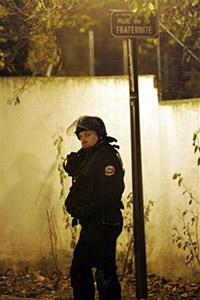 |
 |
 |
 Editorials | November 2005 Editorials | November 2005  
Shake-Up of the Republic
 Serge Truffaut - Le Devoir Serge Truffaut - Le Devoir


| | A riot policeman patrols the southern suburban town of Le Kremlin-Bicetre near Paris, late Tuesday, Nov. 8, 2005. A government-declared 12-day state of emergency was poised to go into effect in riot-torn France at midnight Tuesday, paving the way for curfews in cities and towns crying out for a return to order after 12 nights of the country's worst civil unrest in decades. (AP Photo/Christophe Ena) |
First limited to the Paris region's cités [French housing projects], the conflagration of violence has now reached several provincial cities. Up to now, over 1000 vehicles have been burned and close to 400 people wounded. Given the scope of the events that primarily oppose young North Africans and the forces of order, Prime Minister Villepin has decided to allow prefects [local representatives of the central government] the right to impose a curfew. This measure - allowed for the first time in ages - speaks volumes about the gravity of the situation.

This ruling, taken to re-establish order in the short term, is accompanied by a series of dispositions illustrating the failures of the republican model for integrating immigrants. Or more precisely, illustrating the cynicism of the country's elites. Ten years ago - let us remember - Jacques Chirac got himself elected on the promise of all-out combat against the social fracture. Three years ago, he centered his campaign on security. And now today, here's the president giving his approval for a host of measures that should have been taken in the course of the last ten years.

Prior to North African immigration, the Republican model was based largely, it was understood, on three fundaments: school, for the reasons one can imagine; trade unionism, because it promoted the political socialization of individuals; and military service, which, thank goodness, has been abolished, but which has never been replaced by the civic service envisaged when Lionel Jospin was in the Matignon [French prime Minister's residence]. In short, these vectors of integration are a shadow of what they once were.

When you combine that with the high level of unemployment, and especially with the social ravages unemployment provokes, you get a cocktail of anger, violence, and revolt that - as we observe today - expresses itself with all the more force because there is practically no communication between these youths and the government. More precisely, there is an absence of political representation.

In a study devoted to that subject, Olivier Masclet from the University of Metz notes that "today, immigrants' children are largely absent from the factories, the unions, and the workers' parties that have been at the heart of the political socialization of the working class for a century." The consequence, in part, is a political deficit which the present riots translate.

Yesterday, Villepin indicated that the public contribution to the world of associations would be ... restored! Think about it: one day one strikes up the song about the social fracture and the next day there they are, cutting the budgets for the network that does today what trade unionism used to do, that is, political apprenticeship. Which, above all, promotes involvement in the political debate. The republican model needs a good crack of the whip.

Translation: t r u t h o u t French language correspondent Leslie Thatcher. | 
 | |
 |



